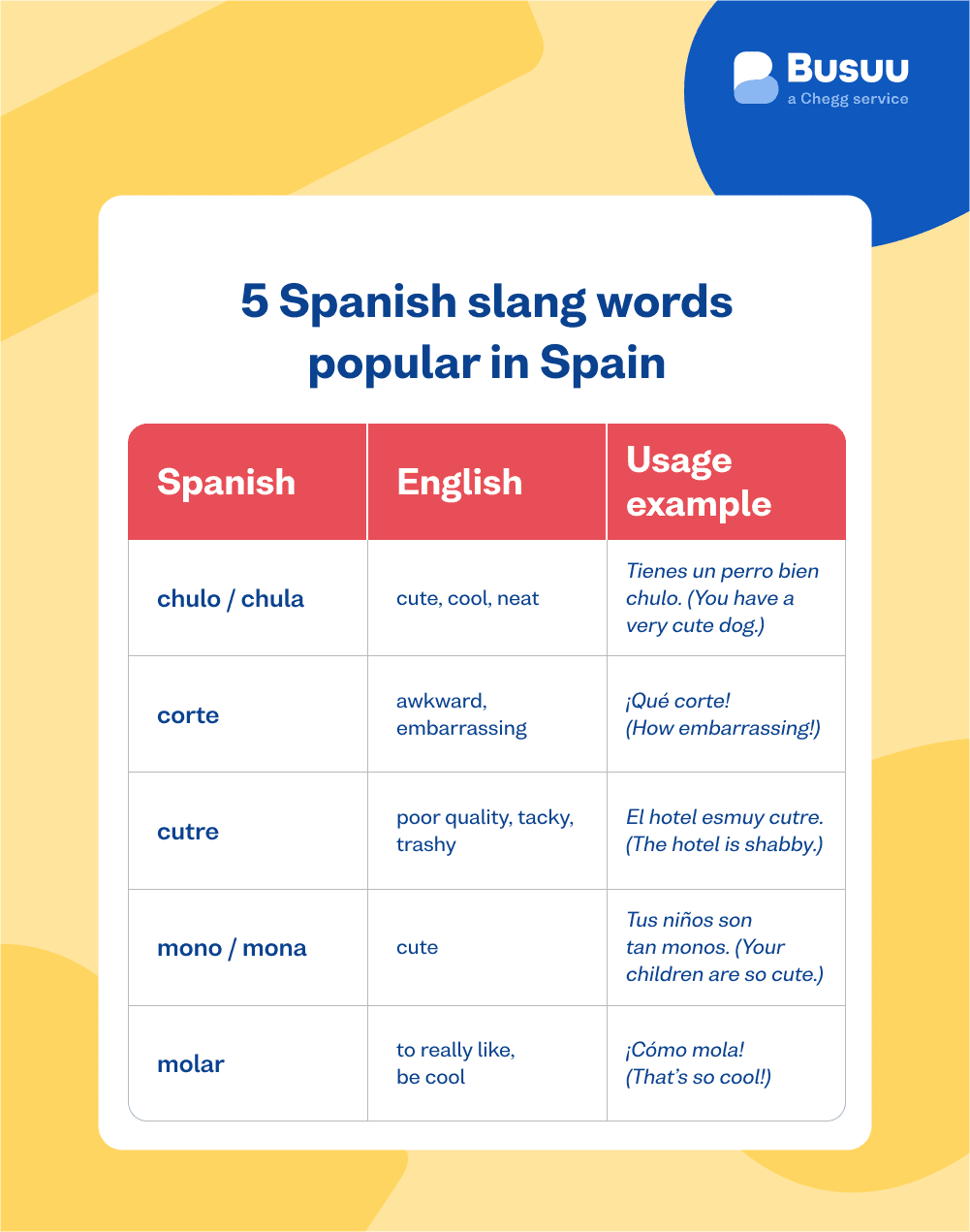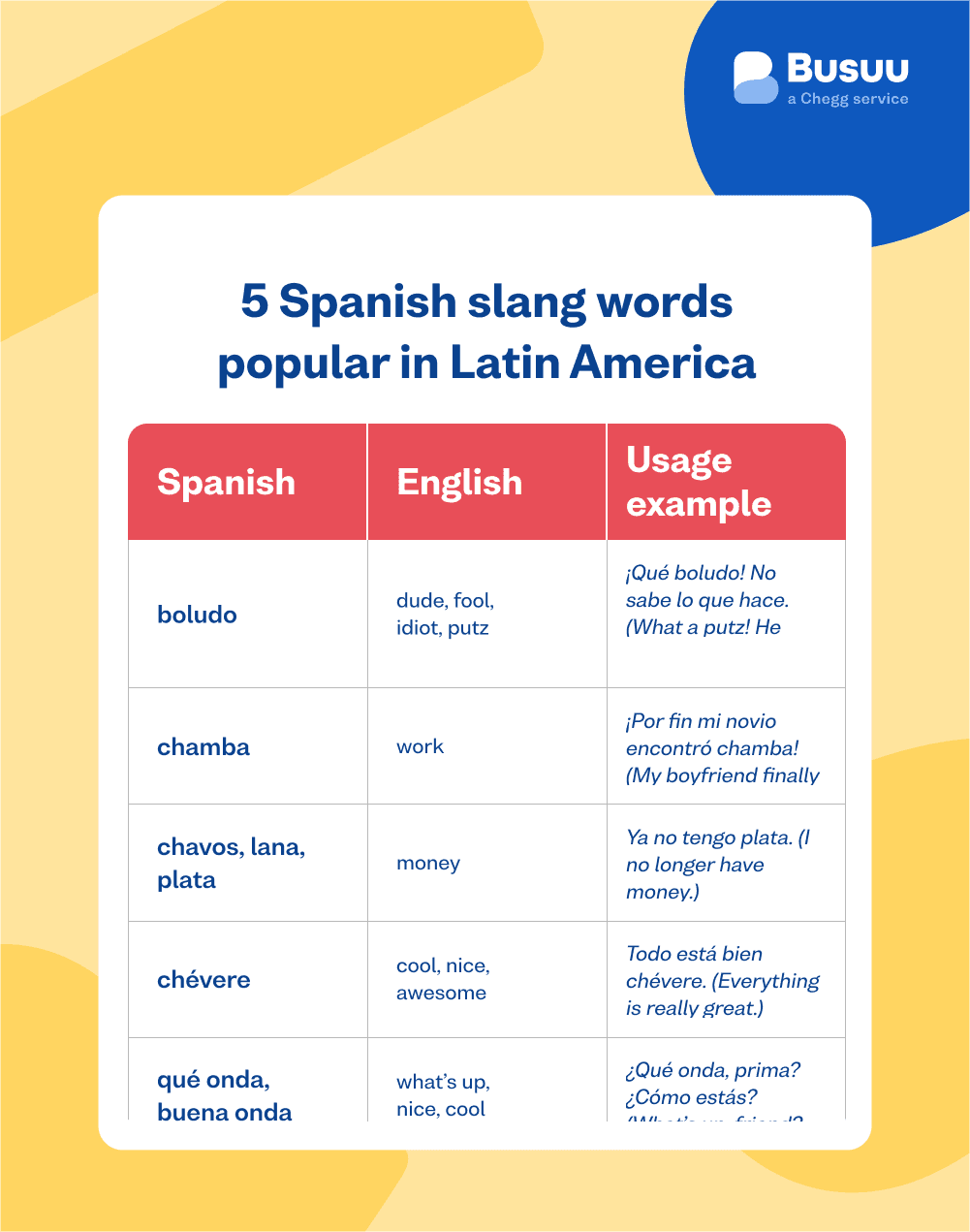I want to learn...
Using Spanish slang terms lets our personalities shine through helping us make connections.
It loosens things up. Spoken language is meant to be informal, not rigid. Slang fills in the gaps between vocabulary and grammar to round out our language skills. In Spanish, people tend to incorporate slang words or phrases not only for their specific meanings but also to fill pauses or navigate smoothly between different topics.
In this article, you will discover 5 slang terms popular in Spain and other 5 that are more common in Latin America (check out our other article also to know more about the differences of Spanish used in Spain and in Latin America). You’ll learn their meaning and how to use them to sound natural and confident when speaking Spanish.
Important to know: A slang term may have a specific meaning in one country but be meaningless or carry an entirely different meaning in another. Spanish is the official language of 20 countries and one dependent territory. Embrace the opportunity to pick up slang from all of them. Slang is a ladder to make connections and friends from all over the Spanish-speaking world!

5 Spanish slang words popular in Spain
1. Chulo / chula (cute, cool, neat)
We use chulo / chula to describe something that is cute, cool or neat. Beware! When applied to a person, it may carry a negative connotation and can mean “cocky” or “pimp”.
Examples:
Tienes un perro bien chulo. (You have a very cute dog.)
¡Qué fiesta tan chula anoche! (What a cool party last night!)
2. Corte (awkward, embarrassing)
Although corte means “cut” or “incision”, figuratively speaking we use corte when we feel embarrassed about something. It can be used as an exclamation or with the verb dar (to give).
Examples:
¡Qué corte! (How embarrassing!)
Dije algo que no sabía que era una palabrota. ¡Qué corte! (I said something that I didn’t know was a swear word. How embarrassing!)
¡Menudo corte! (How embarrassing!)
Derramé un vaso de agua en un restaurante de lujo en una cita. ¡Menudo corte! (I spilled a glass of water in a fancy restaurant when I was on a date. How embarrassing!)
Dar corte algo a alguien (feel awkward, feel embarrassed, get embarrassed, be shy to)
Me da mucho corte hablar en público. (I’m too shy to speak in public.)
Insider tip: Spanish slang words are great for spoken language. But written Spanish is much more formal. What you say in the privacy of a conversation with a close friend may not be appropriate for an email or even social media. Or at least not all slang may be appropriate for social media.
3.Cutre (poor quality, tacky, trashy)
We use cutre to describe a thing with poor quality or something shabby or trashy. When applied to a person, it means stingy or tight.
Examples:
El hotel es muy cutre. (The hotel is shabby.)
Esa película es cutre. (That movie is trashy.)
Mi novio es muy cutre: nunca me compra nada. (My boyfriend is very stingy: he never buys me anything.)
4. Mono / mona (cute)
Literally, mono means “monkey” in Spanish. Nevertheless, we can use the colloquial phrase ser mono to say something or someone is cute.
Examples:
Tus niños son tan monos. (Your children are so cute.)
Mi amiga me dio un regalo muy mono. (My friend gave me a really cute gift.)
5. Molar (to really like, be cool)
We use molar to express a strong liking for something or someone, or to describe them as cool.
Examples:
¡Cómo mola! (That’s so cool!)
La serie mola mucho. (The (TV) series is really cool.)
¿Te mola mi nueva canción? (Do you like my new song?)

5 Spanish slang words popular in Latin America
1. Boludo (dude, fool, idiot, putz)
In Argentina, we use boludo with our friends we know well to mean dude or putz. Although used casually, it should be used with caution as it may be offensive if employed aggressively.
Examples:
¡Qué boludo! No sabe lo que hace. (What a putz! He doesn’t know what he's doing.)
¿Cómo estás, boluda? (How are you, dude?)
Insider tip: Spanish slang terms can be playful, imaginative, obscure, funny, but also inappropriate depending on the context. Read the room. Caution should be exercised when using slang in spoken-language situations as not all slang is suitable for every situation. What you say to your teammate may not be okay to use with your doctor. As you pick up new slang, it’s important to ask a trusted source if the word or phrase is harmless or vulgar. Everyone who’s learned another language has a story about unwittingly using an inappropriate word. The goal is communicating effectively, not to offend someone.
2.Chamba (work)
In Mexico, Peru and parts of Central America and the Andean region, we use chamba with the meaning of job. In Puerto Rico, "chambear" is used as a verb, meaning "to work."
Examples:
¡Por fin mi novio encontró chamba! (My boyfriend finally found work.)
Tengo que trabajar muy tarde hoy. Tengo muchísima chamba. (I’m going to work late today. I have a lot to do.)
3. Chavos, lana, plata (money)
These are three of many slang terms used in Latin America with the meaning of money. The word chavos originally meant one hundredth of a unit and is commonly used) in Puerto Rico.
In Mexico, Panama and Peru we often refer to money aslana (literally, wool) because, in the past, having a lot of wool was synonymous with someone being well-off, as this was a prosperous industry.
The use of "plata" as a synonym for "money" in South America comes from Spanish slang. "Plata" literally translates to "silver" in Spanish, and its association with money can be traced back to the colonial era when precious metals like silver were used as currency.
Examples:
Ya no tengo plata. (I no longer have money.)
¿Tienes chavos, mano? (Do you have money, bro?)
Fun to know: What is the origin of Spanish slang terms? They can be picked up from other languages, made from sound distortions or from generalizing or narrowing down. Often, they come from literary devices such as metaphors, similes, analogies, euphemisms and figurative language.
4. Chévere (cool, nice, awesome)
We use chévere to mean cool or nice mainly in the Caribbean and South America.
Examples:
Todo está bien chévere. (Everything is really great).
El restaurante es muy chévere, me encantó. (The restaurant is awesome, I loved it.)
5. Qué onda, buena onda (what’s up, nice, cool)
The literal translation ofonda is wave, but in Mexico we use qué onda to ask someone how he or she is doing. We also use the phrase buena onda to describe someone as nice or cool.
Examples:
¿Qué onda, prima? ¿Cómo estás? (What’s up, friend? How are you?)
Ella es súper buena onda. (She 's super cool.)
Tip: If you want to hear these and a lot more Spanish slang words from Spain and Latin America, check out our article on the top 10 Spanish series on Netflix to watch in 2023 and get to listen to the actors and actresses in the series use slang words in their scenes!
Wrapping up
Now you know 5 new Spanish slang terms from Spain and other 5 colloquial phrases from Latin America. You'll have a wide array of choices available to express different emotions or feelings!
Don’t be shy, and try them out when you practice your Spanish skills. But be aware of the background of the person you are talking to. Adapt your vocabulary accordingly.
As you learn Spanish slang, you’ll be able to show your personality when speaking this language. You’ll have fun, become more confident and sound more natural, as you speak to people and make friends from Spain and Latin America.
Newlanguages


